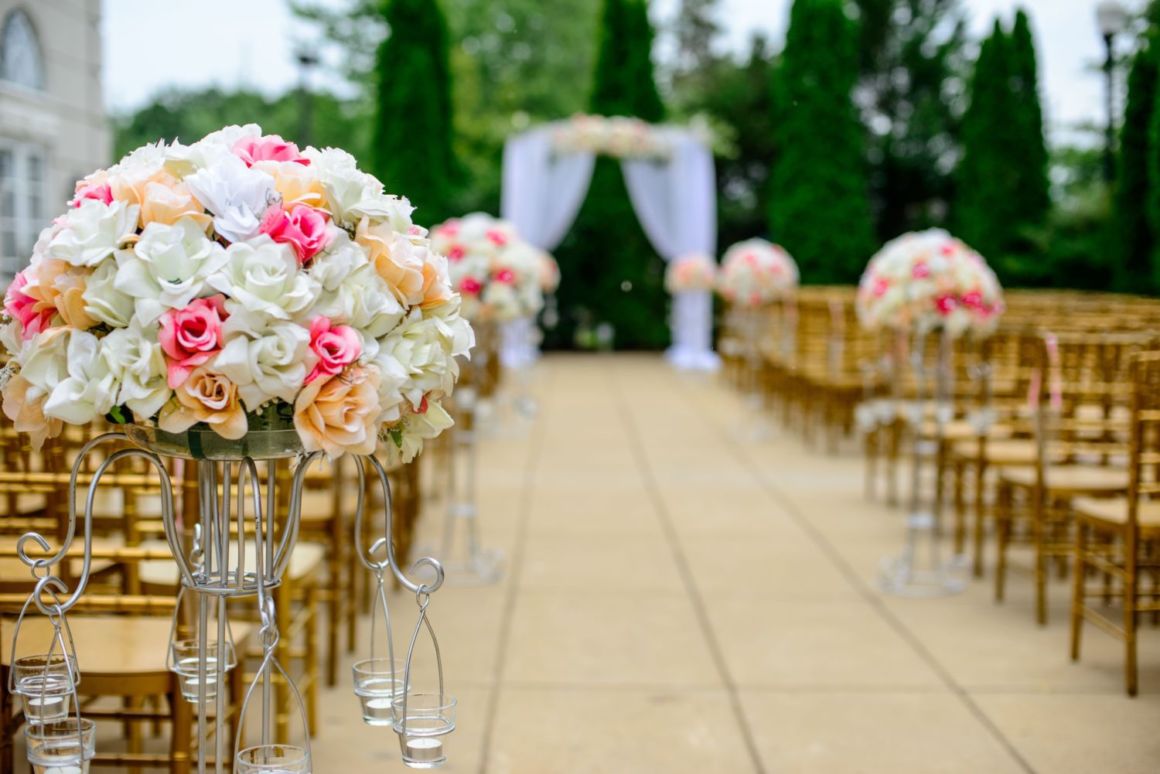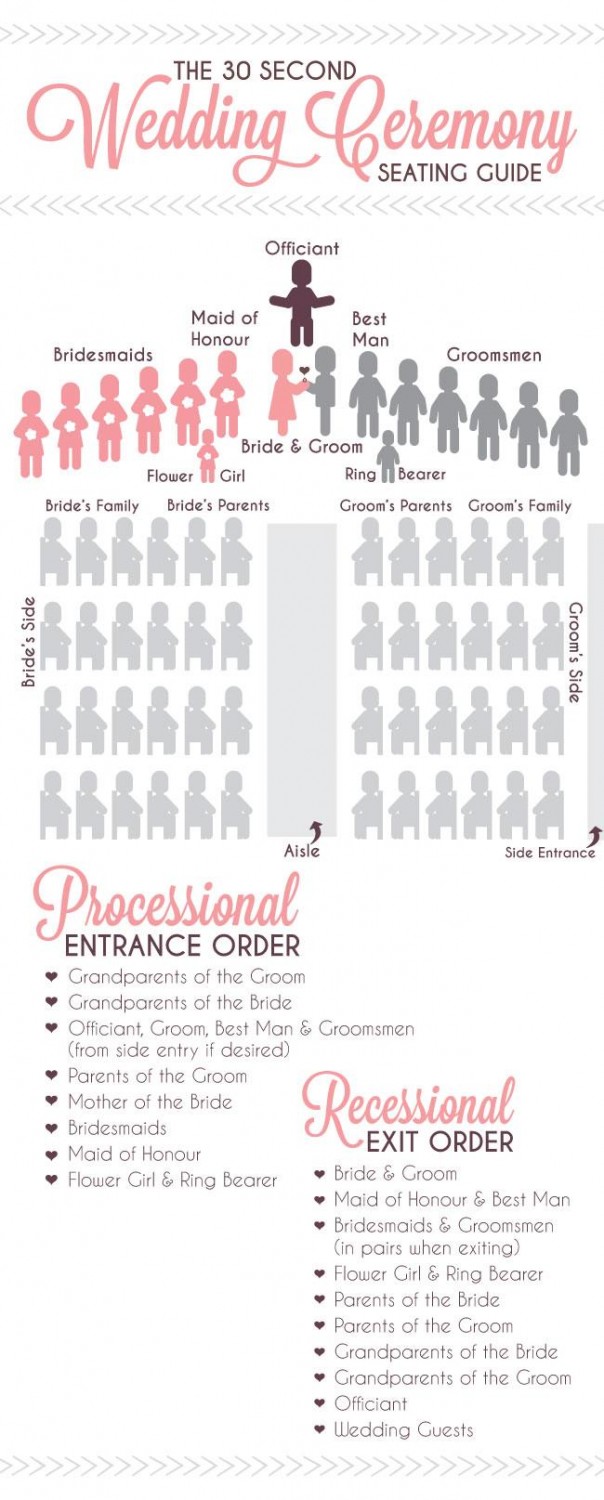The Wedding Ceremony Order of Events
Whether you want your wedding ceremony outdoors, in a church, or still have no idea where it’s going to be, you’re going to need to start planning.
Wedding ceremonies can be traditional, civil, religious and frankly in this day and age they can be whatever you want. When it comes to wedding ceremonies we’re big believers here at Team Wedding that you should be focused on making it personal and special. That’s why we recommend you think about your vows and what they mean to you.
The first you need to remember about your wedding ceremony is the order of events. That’s always a good way to visualize all the things you need to think about.
Whether your service is civil or religious, it will likely follow the same general outline in terms of order of events:
- The Procession
- The Officiant’s Opening Remarks
- The Charge to the Couple
- The Exchange of Vows
- The Ring Exchange
- The Pronouncement of Marriage
- The Kiss
- The Closing Remarks
- The Recessional
Other Wedding Ceremony Tips
- Renewing Your Wedding Vows. Examples and Sample Vows for a Wedding Vow Renewal Ceremony.
- Second Wedding Ceremonies and Vows. Sample Wedding Vows for a Second Marriage.
- Wedding Ceremony Music. Complete Guide to Wedding Ceremony Music and how to plan around amazing songs.
- Wedding Planning Guides. Team Wedding’s ultimate guides to wedding planning. One for each part of your wedding.
- The Ultimate Wedding Checklist. A complete list of all the things you need to do. It is a seriously long list.
- Wedding Vow Renewal Music – 25+ songs sure to make the vow renewal special
Quick Tips To Ensure You Have A Relaxed & Enjoyable Wedding Ceremony
Here are some tips to ensure you have a relaxed wedding ceremony.
- Book vendors early. Have a checklist of questions and items with things that are important to you.
- Prepare a wedding checklist. Arrange your plans so that all preparations are completed a day or two before your wedding.
- State clearly on your wedding invitations the arrival time and ceremony start time.
- Delegate as much as possible to others on the day of your wedding. Friends, family and bridesmaids usually love to get involved.
- Rest and relax – allow yourself to be pampered!
- Eat breakfast. Drink lots of water and avoid drinking any alcohol so that you arrive clear-headed and ready for the wedding ceremony.
- Arrive on time!
- Ensure that someone in the bridal party will have a tissue or handkerchief available – even if you think you won’t need it.
- Choose music that is special for you both. You will have the opportunity to select music for the beginning, the signing of the documents and at the end of the ceremony. Make sure the lyrics are appropriate to your celebration. Delegate the task of managing the music to someone who is confident and relaxed.
- Consider fun things for the children to do! Bubble blowing provides lots of fun for them! If there are young children coming – especially if they are the bridal couples’ children – nominate a special carer. Make sure that the person looking after them has a supply of drinks and nibblies for them and that the child goes to the toilet beforehand!
- If you are having an outdoor wedding, have a back up plan ready to go! This minimises the stress if you have to change plans due to wet weather.
In the build-up to the wedding day, remember why you are getting married! Keep the communication open between you both. Take time out from the wedding planning to just be together. Relax and enjoy!
10 Tips To Writing Your Own Wedding Vows
Penning your own wedding vows is no easy task — it’s like writing poetry, public speaking and having the deepest conversation of your life all at once. Putting your promises on paper is an emotional, eye-opening and often extremely memorable experience. Up for the challenge? Here’s the homework you need to do (and the questions you should ask) to make your vows perfect.
1. Start Really Early
Don’t wait. Lots of people leave writing your vows until the week before the wedding! Too late. You’ll be too nervous, excited and a little stressed so you want be able to focus and dedicate the time your vows deserve. Give yourselves at least a month. When writing your vows remember to do so when you have enough time to be relaxed. Some deadlines we recommend you try to hit are to get a first draft complete about 2.5 weeks before the wedding and have your final version completed at least three days before the wedding.
2. There Is Nothing Wrong With Traditional
To get inspired, start by reading traditional, by-the-book vows — from your own religion, if you practice a certain faith, but others, as well — to see what strikes a chord with you. You can incorporate these into the original words you write, or simply use them as a jumping-off point to base your personalized vows on.
3. Decide On the Tone
This one is really important because it makes life so much easier. Decide early on what you want the tone of your wedding vows to be. Are you going for romantic, poetic, humourous with a touch of romantic? It is totally your decision, remember your vows need to reflect you and your personality and be from the heart. One word of advice: While your vows can be lighthearted they must note the seriousness of the commitment you’re about to make.
4. Make a Vow Date Together
When it’s time to come up with the actual content of your vows, go out to dinner or set aside an evening at home to brainstorm. Talk about your relationship and what marriage means to each of you. Discuss what you expect from each other and the relationship. What are you most looking forward to about married life? Why did you decide to get married? What hard times have you gone through together? What have you supported each other through? What challenges do you envision in your future? What do you want to accomplish together? What makes your relationship tick?
5. Get On The Same Page
Are you each going to write your own vows, or will you write them together? If you’re writing them separately, will you want to run them by each other before the wedding? If you’re writing them together, will they be completely different for each of you, or will you recite some of the same words and make the same promises to each other, as you would with traditional vows? If you want them to be a surprise on your wedding day, make sure you both send a copy of what you’ve written to your officiant or to one friend or family member so they can check that your vows are about the same length and similar in tone.
6. Schedule Some Time On Your Own
Take some time on your own to think about how you feel about your future spouse. How did you meet? How did it make you feel? When did you decide you wanted to spend the rest of your life with him/her? How has your life gotten better since you met? What inspires you about them? What do you miss most about them when you’re apart? What qualities do you most admire in each other? What do you have now that you didn’t have before you met?
7. Steal With Pride
Borrow freely from poetry, books, religious and spiritual texts — even from romantic movies. Jot down words and phrases that capture your feelings. Widely recognized works ring true for a reason. Also the internet is a great place to find examples, get inspired and do research. Don’t be shy about using resources like this but remember your vows are your own so make sure you also reflect on what YOU want to say.
8. Create An Outline
Remember in school it was always recommended that you had an outline before putting pen to paper. Same goes for wedding vows. An outline can get you started by helping to establish a structure. For example, plan to first talk about how great your fiance is and then about how you work together as a couple; pause to quote your favorite writer and then go into your promises to each other.
9. Remember Your Guests
Don’t make your vows so personal that they’re cryptic — or embarrassing! You’ve invited your family and friends to witness your vows in order to make your bond public, so be sure everyone feels included in the moment. That means putting a limit on inside jokes, deeply personal anecdotes and obscure nicknames or code words.
10. Practice Out Loud In The Mirror
These are words meant to be heard by a live audience, so check that they sound good when spoken. Read your vows out loud to make sure they flow easily. Watch out for tongue twisters and super-long sentences — you don’t want to get out of breath or stumble.
11. Understand What Makes Great Wedding Vows
Before you begin writing your vows, it is key to align between the two of you on the tone. Your words may be different, but the tone should be more or less the same. Remember, your vow is your way of making a commitment to each other. That’s the core of wedding vows. All amazing wedding vows have three key elements: A declaration of love (“Nick, my friend, my confidant, my everything. I promise to love you until the end of my days”); promises (“I promise embrace both our similarities and our differences”; andpersonal notes (“When we met five years ago, I never know women like you could ever exist”).
12. Know Your Wedding Vow Style?
There are lots of options when creating your own vows so make sure you talk through what you want to do and you’re both on the same page. For example, decide if you want to say separate vows or if you’d rather each recite an identical vows that you write together. You can also combine these options. There is no right or wrong answer, these are your vows. Just make sure you discuss and get on the same page.
13. Ummm. What Should I Say?
Here’s where we suggest you get some inspiration. Read some poetry, do some research online and see what captures your thoughts. Also, find a quiet place. In the end you may want to follow a few potential themes: Maybe it’s fidelity (“I promise to be faithful”); the notion of two people coming together, but maintaining their individuality (“I promise to have the courage to let you be yourself”); or the importance of family (“I promise to create a family with you and to take yours as my own”). Consider where you first met, the first time he kissed you…can you tie any of this in to what you want to pledge?
14. Consult Your Officiant
Your officiant can be an amazing source of experience so make sure you reach out if you’re struggling with your vows (it also makes sense to let them know you’re writing your own vows, they’ll need to know that). Your officiant can guide you through the process for writing your vows and probably has some examples from other couples as well as religious books too (if your ceremony is religious of course).
The 30 Second Wedding Ceremony Seating Guide
Where does everybody sit during your wedding ceremony? This shouldn’t be hard, but it is when you start to consider parents, stepparents, divorced parents, grandparents, extended family and people from out of town. Don’t fret, here some simple ideas for what to do:
What Side Am I On Again?
In Christian ceremonies, the bride’s side is the left side of the church when facing the alter, and the groom’s side is the right. For Jewish wedding ceremonies, it’s the other way around (bride’s side on the right side). At the end of the day this isn’t too big a deal. If somebody wants to sit on the left side, let them sit on the left side.
Seating Specifics.
- Elderly guests or guests in wheelchairs should be seated near the front or end of the pew.
- The first three rows are typically reserved for immediate and extended family and other special guests.
- Immediate family is seated just before the ceremony begins. Siblings are seated before grandparents. They sit either in the first row with parents or in the second row with grandparents. Start seating with the groom’s side.
- If you have step-relatives, make sure ushers know who they are. Step-relatives should be escorted to their seats first — for example, step-grandparents precede birth grandparents.
- If the bride’s or groom’s parents are divorced, seat the parent who primarily raised the bride or groom in the front row with his/her spouse, and seat the other parent and his/her spouse in the row behind. Alternatively, birth parents may sit beside each other in the first row (discuss this options in advance).
- The bride’s mother is always seated last at a Christian ceremony; the groom’s mother is seated just before her. (In Jewish ceremonies, parents stand under the huppah with the couple).
- Brothers of the bride and groom usually seat their mothers; the head usher can do it if the brothers are in the wedding party, or a brother can seat his mom and then take his place with the other groomsmen.
The Enforces (Otherwise Known As Ushers). How They Can Help.
You can enlist a few of your groomsmen to play ushers. Ushers really need to know where everyone’s supposed to sit — so print out a list for them! It is ok for ushers to greet guests at the door and lead them to their seats, saying, “Please follow me.”
5 Wedding Ceremony Tips You Need To Know
Plan Plan Plan
Your wedding ceremony is about making a lifelong commitment to each other. That commitment is best articulated in the wedding vows you recite to each other. Make your vows really mean something by writing them yourselves. If you do write your own vows, don’t wait till the last minute. See our tips on this page, but you need at least a few months to really get the right.
Combine Families & Cultures
These days every family and culture has their own “special things”. Dont get stuck in a prescriptive and confining traditional wedding for no good reaason when you can personalize your ceremony with elements from both your backgrounds. Despite what anybody else tells you, this is your wedding and if you want to combine traditions and ideas then go ahead and do it.
Honor Important Family Members
Your wedding ceremony is a great time to honor important family members and close friends who aren’t in your wedding. Depending on your type of service, have your moms (or aunts, or uncles, or cousins) light the unity candle or choose several short readings performed by several special readers.
Beautiful Readings
Many couples choose to incorporate meaningful readings into their ceremony, asking a special family member or friend to do the honors, or reading themselves, alternating verses or paragraphs. Regardless of what you select, stick to two or three short passages and consider interspersing them throughout the ceremony to break things up.
Ceremony Music Matters
Most people spend hours thinking about their wedding reception songs but all of ten seconds thinking about wedding ceremony music. You can go traditional for walking down the aisle or a gospel choir to perform more contemporary songs. Check with your venue first and read out guide to planning wedding ceremony music.



